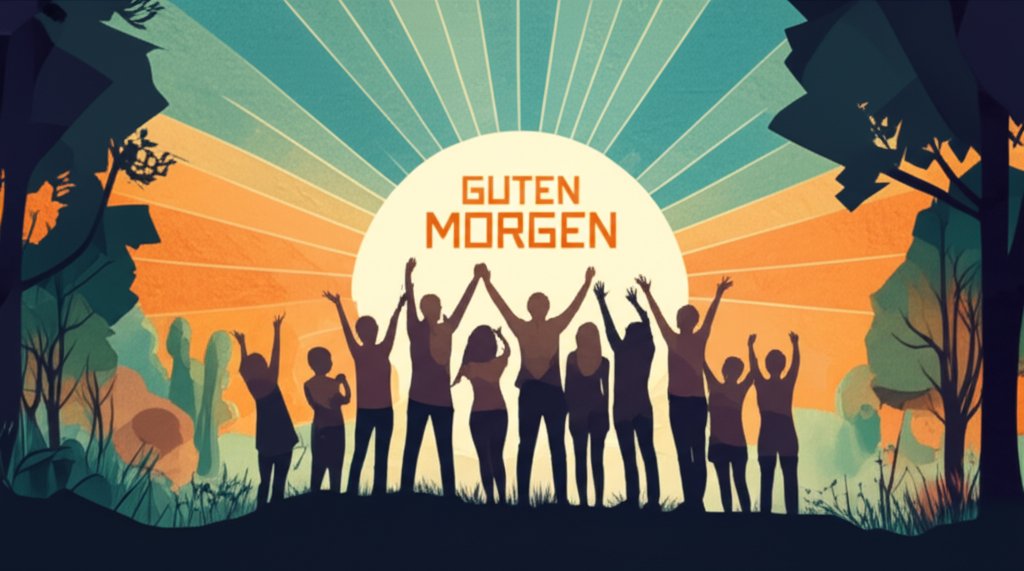Want to impress your German-speaking colleagues or friends? Forget just “hello”—mastering “good morning german” phrases opens doors to warmer, more genuine interactions. It’s not just about the words; it’s about showing respect and understanding the culture.
At a Glance:
- Learn the primary ways to say “good morning” in German, suitable for different contexts.
- Understand the nuances between formal and informal greetings.
- Recognize regional variations in morning greetings.
- Discover how to extend your morning greetings with additional phrases.
- Avoid common mistakes when greeting someone in German in the morning.
The Core “Good Morning German” Phrase
The most direct translation of “good morning” in German is “Guten Morgen.” This is your go-to phrase for most situations. It’s polite, universally understood, and appropriate for almost everyone you meet before noon.
- Pronunciation: GOO-ten MOR-gen. The “g” in “Guten” is hard, like in “go.” The “r” in “Morgen” is pronounced in the back of the throat (a guttural “r”).
Formal vs. Informal: Choosing the Right Greeting
While “Guten Morgen” is generally safe, understanding the subtle differences between formal and informal greetings can enhance your interactions and prevent awkward moments. As a rule of thumb, use formal greetings with people you don’t know well, those in positions of authority, or older individuals.
Formal Greetings:
- Guten Morgen: As mentioned, this is generally suitable in most situations until noon.
Informal Greetings:
Informal greetings are reserved for close friends, family, and colleagues you’re on good terms with. - Morgen: A shortened, more casual version of “Guten Morgen.” Use it like you’d use “Morning!” in English.
Time of Day Matters: Beyond “Good Morning”
Just like in Russian, greetings change depending on the time of day. While “Guten Morgen” covers the morning hours, knowing alternative greetings for later in the day will expand your conversational ability. If you are interested in other languages you might even find Learn Russian Greetings helpful to understand different morning greetings.
- Guten Tag: (Good day) – Used from around 11 AM or noon until evening (around 6 PM).
- Guten Abend: (Good evening) – Used from late afternoon/early evening until bedtime.
Regional Variations: A Touch of Local Flavour
Germany, like many countries, has regional variations in common phrases. While “Guten Morgen” is standard, knowing these alternatives shows a deeper understanding of German culture.
- “Moin Moin” (Northern Germany): This versatile greeting can be used any time of day in Northern Germany, but it’s especially common in the morning. It roughly translates to “hello” or “good day.”
- “Grüezi” (Southern Germany, Switzerland): While not strictly a morning greeting, “Grüezi” is a common, all-purpose greeting in Southern Germany and Switzerland. It can be used instead of “Guten Tag.” In some contexts, it can also function as a morning greeting.
Expanding Your Greeting: Adding Personality
Simply saying “Guten Morgen” is polite, but adding a follow-up question or statement can make the greeting more engaging.
- Guten Morgen, wie geht es Ihnen? (Formal: Good morning, how are you?)
- Guten Morgen, wie geht’s? (Informal: Good morning, how’s it going?)
- Guten Morgen, alles gut? (Informal: Good morning, everything good?)
- Guten Morgen, gut geschlafen? (Informal: Good morning, did you sleep well?)
- Guten Morgen, auf geht’s! (Informal: Good morning, let’s get started!) – use this with colleagues when starting work
Common Mistakes to Avoid
Even simple greetings can be tricky for language learners. Here are some common mistakes to avoid:
- Using “Guten Tag” too early: Avoid using “Guten Tag” before late morning (around 11 AM or noon). Sticking with “Guten Morgen” is safer.
- Overusing formal greetings: If you’re unsure, it’s better to err on the side of formality, but continually using formal greetings with close friends can sound stiff.
- Mispronouncing “Guten Morgen”: Get the pronunciation right. Practice saying it aloud until you feel confident. Many online resources offer audio examples.
- Ignoring regional variations: While not a mistake, using regional greetings shows cultural awareness. However, be mindful of where you are and who you’re speaking to. Using “Moin Moin” in Southern Germany might elicit confused looks.
A Practical Playbook: Mastering German Morning Greetings
Here’s a step-by-step guide to confidently use German morning greetings:
- Start with “Guten Morgen”: This is your foundation. Practice the pronunciation until it feels natural.
- Assess the situation: Who are you greeting? Are they a friend, colleague, or stranger? Adapt your greeting accordingly.
- Choose formality: If in doubt, stick with “Guten Morgen.” For close friends, opt for “Morgen.”
- Add a personal touch: Follow up with “Wie geht es Ihnen?” (formal) or “Wie geht’s?” (informal) to show genuine interest.
- Listen and learn: Pay attention to how native speakers greet each other. This will give you a better sense of context and appropriate usage.
- Embrace the local flavour Be aware of any regional variations where you are.
Example Scenarios:
- Meeting your boss in the office: “Guten Morgen, Herr/Frau [Last Name]. Wie geht es Ihnen?” (Good morning, Mr./Ms. [Last Name]. How are you?)
- Greeting a close friend: “Morgen! Gut geschlafen?” (Morning! Did you sleep well?)
- Entering a bakery in Northern Germany: “Moin Moin!”
Quick Answers: FAQs About “Good Morning German”
- Is “Guten Morgen” too formal? Generally no, it’s a safe and polite greeting for most situations in the morning.
- Can I use “Hallo” in the morning? While “Hallo” (hello) is universally understood, it’s less specific and lacks the warmth of “Guten Morgen.”
- What if I forget the correct greeting? Don’t panic! A simple “Entschuldigung” (excuse me) followed by the correct greeting is perfectly acceptable. People will appreciate the effort.
- Is it rude to use English greetings in Germany? Most Germans understand English, but using German greetings shows respect and a willingness to engage with the local culture.
- Is there a female ending for ‘Guten Morgen’? No, the form remains ‘Guten Morgen’ for both genders.
Actionable Close: Start Your Day Right
“Guten Morgen” is more than just a phrase; it’s a cultural key to unlocking more meaningful exchanges in Germany. Master the basics, understand the nuances, and don’t be afraid to practice. Start with “Guten Morgen” and build from there. The effort you put in will be appreciated.
- Good Morning Images to Share with Loved Ones - January 10, 2026
- Handsome Good Morning Message for Him Long Distance to Make Him Smile - January 9, 2026
- Find the Perfect Good Morning Handsome Gif for Him - January 8, 2026










